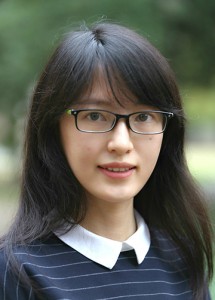 Dingqiao Wen recently received a Ken Kennedy Institute for Information Technology fellowship for her academic achievements and her computer science research on the Bayesian inference of reticulate evolutionary histories. But she arrived at Rice University planning to pursue bioengineering. “I was looking for an adviser that first year,” said Wen. “I had no computer science background, so I talked with Luay about ways to connect my interest in biology with CS.”
Dingqiao Wen recently received a Ken Kennedy Institute for Information Technology fellowship for her academic achievements and her computer science research on the Bayesian inference of reticulate evolutionary histories. But she arrived at Rice University planning to pursue bioengineering. “I was looking for an adviser that first year,” said Wen. “I had no computer science background, so I talked with Luay about ways to connect my interest in biology with CS.”
Luay Nakhleh, a professor of both biosciences and computer science, had a lot of experience blending those two fields–his Bioinformatics Group builds tools for biologists to use to further their own research. “Luay encouraged me to take courses like Algorithms and Bioinformatics,” said Wen. After a year, she bounced from bioengineering to CS, with Nakhleh as her adviser.
Now in her fourth year of the CS PhD program, Wen readily admits her change of course is unusual. “My case is special,” she said. “At first, I took classes like algorithms that focus on logic and didn’t require much programming. I knew what intellectual key points needed to be conveyed in my research, so I moved on to parallel computing, object-oriented programming, and took Dr. Devika Subramanian’s classes on artificial intelligence and statistical machine learning.”
Already familiar with mathematical modeling, she discovered the importance of data mining. “While an undergraduate, I worked in biology labs, doing experiments. I understood what we were trying to accomplish and that we needed to analyze a lot of data, but we lacked the techniques because we didn’t have CS expertise.”
After her early CS classes at Rice, she took a statistics course to help align her algorithmic thinking with her modeling ideas. “The CS classes are designed well,” she said, “and prepared me well for system-level software engineering. Now when I am doing my research, I am combining my machine learning, algorithms, parallel computing and software engineering into a single project.”
Wen’s primary research focus is the application of machine learning methods to biological data and she is collaborating with a professor from the University of Indiana. “He came to the medical center to give a talk and provided our research group data to analyze,” she said.
Wen encourages other PhD students to attend a wide range of talks, taking advantage of Rice’s close connections with the medical center and other universities. “Find a collaborator and work with other people.” she said.
She also advises grad students to read papers published in their field of interest. “But most importantly, discuss with your adviser about your project. They can give you a very deep kind of direction so you can maximize your efforts and progress.”
Her appreciation of the close relationship Rice CS professors have with their graduate students is rooted in the encouragement her own adviser provided as she considered changing course and continued to offer. She said, “Luay is very supportive, and he is the one who recommended me for the fellowship.”
For more information on the 2016 Ken Kennedy Institute fellowships, see the CS website: https://cs.rice.edu/news/ken-kennedy-institute-announces-winners-annual-fellowship-awards
Dingqiao Wen, sometimes called “Ellie,” completed her M.S. in CS in 2016. Her adviser is Luay Nakhleh.